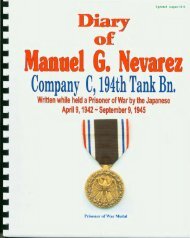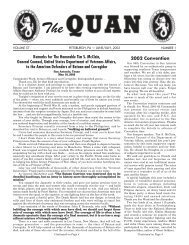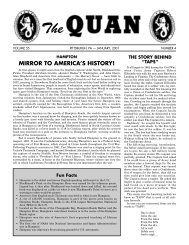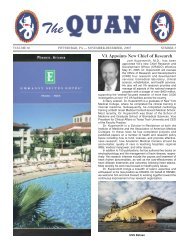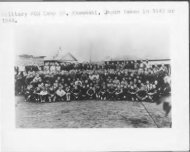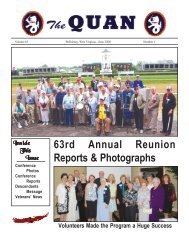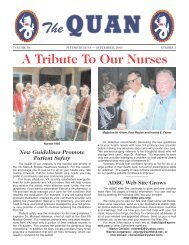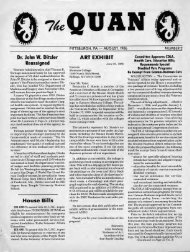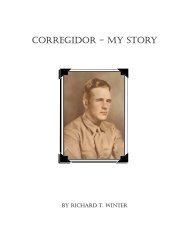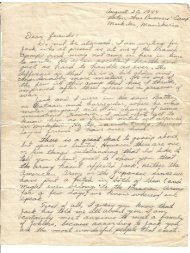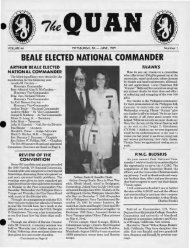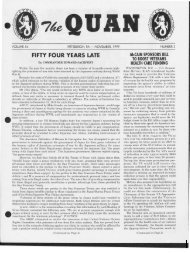LAS VEGAS - Philippine Defenders Main
LAS VEGAS - Philippine Defenders Main
LAS VEGAS - Philippine Defenders Main
You also want an ePaper? Increase the reach of your titles
YUMPU automatically turns print PDFs into web optimized ePapers that Google loves.
MEn YOUR NEW<br />
HAnOHAl COMMANDER:<br />
PHILIP ARSLANIAN<br />
Philip Arslanian. retired USAF Willi<br />
elected to the post of Nations] Commander<br />
at. t.he Las Vegas convention in May. Phil<br />
and his wife Mildred are staunch supporters<br />
of ADBe. and can be seen at most<br />
every official function of this organization.<br />
Phil Willi a member of the 17t.h Pursuit<br />
Squadron at Nichols Field in Manila. After<br />
release from Lovell General Hospital, Ft.<br />
Devens. Ma .. he went back on active<br />
military duty until retirement in June<br />
1961. He then joined the civilian ranks of<br />
the USAG 88 8 Management Analyst with<br />
the Air Force Communications Service. He<br />
remained active in civilian service until his<br />
retirement in December 1979. Phil and his<br />
wife now reside at. 114 Seagate Lane in<br />
Hyannis. Ma.<br />
GREETINGS<br />
We have had good response on our<br />
proposed Christmas Greetings sec·<br />
tion for the Christmas issue of the<br />
QUAN. If you missed the June<br />
QUAN we plan to publish your<br />
Christmas greetings not to exceed<br />
I" of column space. We ask a donation<br />
of 15.00, If you can't afford t.he<br />
15.00 send the greetings anyway.<br />
With the cost of cards and stamps<br />
as they are, we think it's a bargain.<br />
Mail to QUAN Editor direct. with<br />
the information you wish printed.<br />
<strong>LAS</strong> <strong>VEGAS</strong><br />
Convention Report Supplement:<br />
Due to a number of oversights in my original convention report. I feel obligated to<br />
submit the roUowing supplemental report:<br />
One very important. function at the convention was the 24th Pursuit Group luncheon.<br />
This was the first gathering at which many of the former members of that<br />
organization had attended, Many had not seen one another since the early stages of the<br />
War. Our recently elected National Commander. Phil Arslanian is a former member of the<br />
17th Pursuit Squadron, And. you can imagine the plaudits handed out by the many attendees<br />
who a.1.80 were members of that organization, We were happy to see William R.<br />
"Cowboy" Wright and his wife Brocky awarded a nice plaque for their untiring effort.8 at<br />
keeping the many members of the 24th Pursuit Group. and especially those of the 17th<br />
Pursuit Squadron in contact with each other, Col. John Brownewell, the driving force<br />
behind this reunion of Army Air Corps people did an outstanding service to us all. He did<br />
most of the corresponding with the Officers, while Cowboy and Btocky maintained a constant<br />
stream of correspondence with the enlisted personnel Many faces in the crowd were<br />
familiar, however some were not so easily recognized.<br />
The years do something to our memories , , . and to the features of people, It was<br />
truly a thrili to meet up with . , . George Armstrong . , . John Gillespie. , . Cy Blanton<br />
... "Hoot" Horrigan . .. ,Jack Dale .. , Dave Patterson, . , Ralph Forth ... Len<br />
Korpal . , . Ed Erickson , .. Hy Bernstein ... Sam Boghosian . , , Monty Montgomery<br />
(Northwestern States Chapter perennial Commander) , .. Dick Fellows.<br />
Dave Obert ... George Brignall ... Dick Damm ... Harold Fowler .. . Bob Vogler<br />
. , . Marshall Roe ... Sam Grashio . .. Maurice HugheLt .. . Bob Brown ...<br />
I know there Weril more t han are listed that attended. but without the help of<br />
Cowboy or John Brownewell I just can't remember the rest _ . . and I probably bave<br />
some of the above in error. I do know that the roster of attendees that appeared in t he last.<br />
issue of the QUAN omitted some who actually attended. That. was due to the fact that<br />
the registration lists that I received did not show them. So. for all of those who did attend<br />
the 36th National Convention. and their names were omitted from our list andlor the<br />
QUAN. I apologize. and if you care to. drop me a line and I'U send it in for publication,<br />
Another very important and truly<br />
dedicated participant at our convention<br />
was the Master of Ceremonies, .. none<br />
other than ART BRESSI! Art has been<br />
one of Lhe staunchest supporters of and<br />
hardest workers in this organization. And.<br />
as usual, he did a very fine job with the<br />
MC 's duties. Not only that. he was like a<br />
" right-arm" to me during almost every<br />
day of the convention. He even served 8S<br />
the Conductor in wheeling me around in<br />
the wheel chair that day I was confined to<br />
it. Thanks Art. for a job well done.<br />
I failed to mention "Boots" Edminston<br />
of Las Vegss. who assisted in the putting<br />
together of the " goody bags" that were<br />
passed out at the convention. I indicated<br />
that we were missing some of the regulars<br />
who are at most of the conventions. Two<br />
faces that were misaing this convention<br />
were Lou & Zola Sachwa1d. Lou. a Past National<br />
Commander. was just too rushed in<br />
his sales at. this period. and although. they<br />
wanted to attend it was not to be. We all<br />
missed you two ... God bless.<br />
I'm hsppy to report that both John Bennett<br />
and H,erman Boren are doing great<br />
after thoir sick seiges at Las Vegas, Also,<br />
we were able, with the help of Congressman<br />
Derwinski of the Chicago area,<br />
and the fine efforts on the part of the pe0ple<br />
in the Veterans Administration Central<br />
Office. to get Chester Perry moved to<br />
Hines Hospital near his home. He is stili<br />
quite ill. But. I understand the fact that. he<br />
is closer to his home. and that fellow<br />
veterans come to see him on a daily basis.<br />
he is making some progress t.oward.<br />
recovery. r'm sorry t.o bave t.o report that<br />
the Florist who provided the wreaths, etc.<br />
for the Memorial Services passed away<br />
two weeks ago.<br />
The National Archives has some<br />
photographs of some of the Prisoners of<br />
War being released in Japan in 1946. I will<br />
be corresponding with the person in the<br />
Archives wno ia in charge of this particular<br />
area. and if I am able to procure any of<br />
these photos, I wili send them to the<br />
QUAN for publication.<br />
Of course, there are still areaa and activities<br />
of t.he convention that I have not<br />
(Con tinued on Page 3)
Joseph A. Vater<br />
Editor The QUAN<br />
18 Warbler Drive<br />
McKees Rocks, Pa 15136<br />
Dear Joe:<br />
June24,1981<br />
With Secretary & 1're8.9urer Jim Young<br />
of the Northwest Chapter ADB&C, work·<br />
ing and having a sick wife I am not aure<br />
whether he has had time to get a report off<br />
to you concerning our recent get together<br />
and election of officers. So I will send you a<br />
report just in case..<br />
The Northwest Chapter of the American<br />
<strong>Defenders</strong> of Bataan and Corregidor held<br />
their Annual Meeting at the American<br />
Legion Hall Broadwater Ave., Billings,<br />
Montana. The following officers were<br />
elected for 1981 & 1982 year.<br />
Commander Harry B. Greenleaf,<br />
Roberts, Montana.<br />
Sr. Vice Commander Wm. " Bill" M'<br />
nold, Billings, Montana.<br />
Jr. Vice Commander Gerald Kelly,<br />
Sheridan, Wyoming.<br />
Sec'y. Treas. James M. Young, Billings,<br />
Montana.<br />
Adjutant Lewis Elliott. Missoula,<br />
Montana.<br />
Chaplain Tom Hammil, Dickinson,<br />
North Dakota.<br />
Service Officer Monty Montgomery,<br />
Brigham City. Utah.<br />
Stan Dawson is Honorary Service Of·<br />
ficer. Powell, Wyoming.<br />
Directors: Phil Cammeron, Livingston,<br />
Montana; Hugh Branch, Cut Bank. Mon·<br />
tana; and Tom Hattain. Joliet, Montana.<br />
Greg Rodrequ& of MSU W8.9 there to<br />
give the boys what help he could towards<br />
resolving any problems they might have<br />
with claims with the Veterans Administra'<br />
tion. He asked each and everyone to write<br />
to the President and mail the letters to him<br />
and he was to have Senat.or Max Baucus<br />
hand carry them to the President.<br />
Considering the high cost of gasoline we<br />
had a very well attended meeting and<br />
Social Rour, followed by a dinner at 7:30<br />
p.m. The entire program was enjoyed hy<br />
all Old acquaintances were renewed and<br />
some new friends were welcomed. Lots of<br />
Prison Camp life was relived and problems<br />
of the times were ffflely discussed.<br />
A cake was furnished for the Dinner by<br />
the Greenleafll. It wall decorated with the<br />
<strong>Defenders</strong> National Emblem with a Palm<br />
Tree at each end. Just an idea by me. We<br />
got many fine comments on both the<br />
decorations and the quality of the cake. No<br />
tha.t was one I did not make. I had it made<br />
by a woman I used to work for in a<br />
restaurant. I will say she did a good. job as<br />
I knew she would.<br />
Our next meeting will be held June J2.<br />
1982 at Missoula, Montans. Lewis and<br />
Glenda Elliott will be in charge of<br />
arrangements.<br />
Our be9t to you and all our friends in the<br />
ADB&C.<br />
Harry & Wanda Greenleaf<br />
4 - THEQUAN<br />
MARK E. NEHL<br />
My husband, Mark E. Nehl, 63, passed<br />
away at our home in Keldron, SO on June<br />
21.1981. He had a known heart condition,<br />
a nervous condition and numerous other<br />
health problema due to 1m 40 months of<br />
J apanese internment.<br />
Mark served with M Bty 60th Coast Artillery<br />
jSSgt) and had been stationed in the<br />
<strong>Philippine</strong> Islands for over a year before<br />
World War II was declared.He was one of<br />
the 3 men who survived a direct hit on a<br />
gunpit on top of Melinta Hill on April 29,<br />
1942. He was a Japanese POW from the<br />
surrender of Corregidor May 6. 1942 to<br />
September 4, 1945. He was in the Victory<br />
MiUdl. interned at Cabanatuan Camps No.<br />
3 and No.1, at Lipa Batangas. at Camp<br />
MUrphy, at Bilibid, on a priann ship to For·<br />
mosa 39 days jOet. '44·Nov. '44). I believe<br />
he called the ship the " Banji Maru"-the<br />
ship was loaded with prisoners standing up<br />
on coal when they left the <strong>Philippine</strong>s. So<br />
many of the men died on that trip, the r&<br />
maining ones could lie down on the coal<br />
before they reached Formosa. He was in<br />
Formosa for B couple of months before<br />
another prison ship journey of 12 days to<br />
Moji, Japan. The remainder of his intern·<br />
ment from January 1945 until his reiea&e.<br />
he worked in a copper smelter at Kosska,<br />
Japan.<br />
He was a receipient of the American<br />
Defense Service Ribbon with 1 .Bronze<br />
Star, Asiatic-Pacific Campaign Ribbon<br />
with 2 Brotue Stars, <strong>Philippine</strong> Defense<br />
Ribbon, Good Conduct Medal.<br />
Distinguished Unit Badge with 2 Oak Leaf<br />
Clusters GO No. 14 9 March 42 and the<br />
Victory Ribbon.<br />
Sincerely,<br />
Evelyn IMrs. Mark) Neh!<br />
Dear Joe:<br />
Just a bit of information that might be of<br />
interest to all of our members.<br />
Mr. Chester J . Perry, the member who<br />
was so seriously ill at the convention was<br />
evacuated from Las Vegas to Hines VA<br />
Hospital in Illinois. This puts him very<br />
cloae to his home of record. I've written letters<br />
of appreciation to the V A Central Of·<br />
fice, VA local office, Peny's representative<br />
in Congress, thanking them all on their ef·<br />
forts to provide the Air Ambulance to take<br />
him back home. He is still very seriously<br />
ilL<br />
Enclosed is a photo of me presenting one<br />
of the ADBC plaques to Col. G. Barney<br />
Rawlings who sang for us during the con·<br />
vention. If you've got the room, it might be<br />
nice to run it in the QUAN.<br />
I'm still receiving many nice notes of<br />
thanks and congratulations on the conven'<br />
tion. That makes all of the headaches and<br />
" back·aches·' all worthwhile. Just to know<br />
that the majority of our members were<br />
happy and enjoyed themselves.<br />
Hope that this finds you and yours in the<br />
very best of health and spirits, I remain,<br />
Sincerely,<br />
Ralph Levenberg<br />
GERALD BEEMAN<br />
Ger-a1d L. Beeman, 61, of 33 Upper<br />
Hillsida Dr" Bellbrook, a civic leader-,<br />
former public relations director and<br />
prisoner-of,war, died at Kettering Medica1<br />
Center Monday. May 19, 1981 following a<br />
lengthy illness.<br />
Until retirement in 1980, after 26 years<br />
of federal service, he was public relations<br />
officer for Defense Electronics Supply<br />
Center (DESC) in Dayton.<br />
He was born in Mt. Vernon Nov. 19,<br />
1919 and resided in Bellbrook since 1967.<br />
In 1949 he. received s degree in puhlic<br />
relations·journalism from Kent State<br />
Univer-sity.<br />
Mr. Beeman joined the U.S. Marine<br />
Corps in 1938 and at the time of the Pearl<br />
Harbor attack was stationed at the United<br />
States Legation in Peking, China. He was<br />
taken prisoner in 1941 and spent all of<br />
World War II , to 1946, in POW camps in<br />
China and Jspan.<br />
Surviving are his widow, the former<br />
Kathleen Aldous: two sons, William of<br />
Bellbrook and John of Centerville; two<br />
daughters, Miss Jane Beeman of Hays,<br />
Kan .. and Miss Ann Beeman of Bellbrook;<br />
two brothers, Eugene of Columbus and<br />
Virgil of Mt. Vernon; a sister, Mrs.<br />
Virginia Totman of Mt. Vernon.<br />
WILLIAM H. PAnERSON<br />
William H. Patterson. 62, of 414 N.<br />
Chaparral died 11·4·80 in a Houston<br />
hospital after a long illness.<br />
He was an Army veteran and was taken<br />
as a prisoner of war on Batalln.<br />
Survivors include his wife, Beatrice M.<br />
Patterson of Corpus Christi; two sons,<br />
Donald and Mark Allen Patterson, both of<br />
Corpus Christi; and two granddaughters.<br />
Bill served with t he 31st infantry.<br />
DECEASED<br />
Stanley Gladys, 3003 Vista, Long<br />
Beach, CA 90803. Died March 1979 - No<br />
other details.<br />
Satwin C. Alvarado. Jr.<br />
1609 East Santa Clara Street Apt. 1<br />
San J osa. Calif 95116<br />
M Co. 3rd Bn. 4th Marines<br />
Passed away July 18, 1980<br />
No other details available.<br />
Estille Dunham<br />
ill Veterans Home<br />
Quincy, m62301<br />
Died Nov. 1980<br />
Wake Island Marine<br />
Leonard G. Mettscher-<br />
815 West A. Street<br />
Joplin. Missouri 64801<br />
Died Feb. 7. 1981<br />
Survived by wife Marie<br />
Wake Island Marine<br />
QUANS RETURNED DECEASED<br />
Col. N.H. Van Sicklen<br />
635 Sunset Dr.<br />
Hendersonville, N.C. 28739<br />
Major Lester I. Fox. M.D.<br />
ISO Briarcliff Acres<br />
N. Myrtle Beach, S.C. 29582
Richard Gillett. J im Ross, George Annstrong, Bob Vogler, Ed Ericksoll. Dick Damm,<br />
John Gillespie, Maurice Hughett, George Brignall, Harold Fowler, Hi Messmore, Ralph<br />
Forth, Cy Blanton. Bob Brown, Joe Kruzel, Cowboy Wright, Dave Obert, Phil Arslanian.<br />
J ohn Brownewell, Hyman Bernstein.<br />
(Note: Bob Brown is 34th Pur. St.1<br />
Btry. A 60th CA (AA) as of Dec. " 1941<br />
Capt. Calvert. Wilbert A.<br />
1st Lt. Arvin, Charles A.<br />
2nd Lt. Ellard. John A. J r.<br />
2nd Lt. Smith. John S.<br />
1st Sgt. McKeller. Shelley R.<br />
T/Sgt. Towers. Roland W.<br />
SlSgt. Anderson, Leonard V.<br />
SISgt. Beierste
Bataan<br />
You cannot qualify war in harsher terms<br />
than I will. War is cruelty, and you cannot<br />
refine it.<br />
-William Tecemseh Sherman.<br />
Men will not. fight and die without knowing<br />
what they are fighting and dying for.<br />
- Douglas MacArthur.<br />
The Bataan Peninsula is a small rocky<br />
province in the <strong>Philippine</strong>s. sandwiched<br />
between Manila Bay to the east and the<br />
South China Sea to the wes t.. In the 1940's,<br />
8S today, Bataan was primitive. featuring<br />
few highways and towns.<br />
On this thumb of volcanic rock. covered<br />
with tropical flora and tipped to the south<br />
by tiny Cortegidor Island. Mercer County<br />
lost., practically speaking. half a generation<br />
of sons to the War in the Pacific.<br />
In November of 1941. 66 men from<br />
Mercer County received overseas<br />
assignment! to Lhe <strong>Philippine</strong>s and part oj<br />
t he 19200 General Headquarters Tank<br />
Battalion. The battalion arrived at Fort.<br />
Strotenberg. and was t ransrerred to Clark<br />
Field, an American airstrip, situated in<br />
Luzon Province on the mainland.<br />
On Dec. 8, 1941. shortly after noon, one<br />
day aft.er the bombing of Pearl Harbor,<br />
Clark Field was demolished by a Japanese<br />
air strike.<br />
Following the attack, the separate U.S.<br />
tank battalions were ordered to the northwest<br />
and southeast portions of Luzon<br />
Province to repel Japanese amphibious landings<br />
on the <strong>Philippine</strong> shores.<br />
After months of battle, the depleted U.S.<br />
forces withdrew to the Bataan Peninsula,<br />
swept by the tide of the constantly<br />
replenished Japanese Imperial Army.<br />
tn a memorandum dated either February<br />
or March of 1942. Lt. General Masaharu<br />
Homma, commander of the.! apanese forces<br />
in the <strong>Philippine</strong>s. stated that while the<br />
Japanese Army was slowly beating back<br />
the American forces. the Americans were<br />
still able to see through most every Imperial<br />
battle plan. This. to Homma, was<br />
" disappointing."<br />
April 9. 1942. Tired, dehydrated, halfstarved,<br />
the men defending Bataan are surrendered<br />
by order of Major General Edward<br />
P. King.<br />
Thus began what was later called "The<br />
Death Mareh," a confused., inhumane foreed<br />
march through the wilds of Batean.<br />
Soldiers who survived the trip were LO be<br />
sent to either prison camps or work details<br />
inside Japan. Within the 12 days it took to<br />
complete the journey, 5,000 Americans<br />
and FilipinOS succumbed to disease, starvation,<br />
infection, and Japanese bayonets.<br />
Some of the men, however, escaped im·<br />
mediate capture and made their ways to<br />
Corregidor Island. or "The Rock," only to<br />
surrender to the Japanese on May 6, 1942.<br />
Of the 66 men from Mercer County involved<br />
in the death march and the ensuing<br />
imprisonment, only 37 returned home.<br />
The men of Bataan were honored in a<br />
celebration sponsored by the HtuTodsburg<br />
Historical Society at Old Fort Harrod<br />
StaLe Park. The guesl. speaker at the<br />
celebration will be Col. Edward H. Day Jr.<br />
who is presently serving as Provost Marshal<br />
of the U.S. Army Armor CenteT at<br />
Fort Kno •.<br />
What follow s are the recollections of<br />
three survivors, Edwin Rue, Bland Moore.<br />
and Kenneth Hourigan, and one widow,<br />
Mrs. Esther VanArsdall.<br />
"None of our troops ever surrendered,"<br />
exclaimed Edwin "Skip" Rue as he sat in<br />
the den of his house located on Tremont<br />
Drive in Lexington. "We were surrendered<br />
by high command."<br />
During the battle. for Bataan. Rue was<br />
captain of the 192nd and liaison officer to<br />
General James R. N. Weaver.<br />
Rue said he received his orders to surrender<br />
while in t.he field with his men. As is<br />
standard procedure, Rue stripped himself<br />
of all ammunition, dismantled his<br />
.45-caliber automatic handgun and threw<br />
the pieces in different directions into the<br />
thick, jungle undergrowth.<br />
It was a crazy night, he recalled. One flU·<br />
ed with roars and flashing lights. and of all<br />
things, an earthquake. The American<br />
forces were exploding ammunition<br />
stockpiles. There was utter chaos.<br />
The men were assembled at Balanga, he<br />
said. a small town in the south of Batasn.<br />
The 78,000 Americans and Filipinos were<br />
already underfed and exhausted from the<br />
four-month campaign prior; even before<br />
the surrender, food was scarce. " I'd pick<br />
up some food from the Filipinos- most of<br />
it was dirty. One (Filipino) brought me a<br />
DOZEN HARD BUNS, AND I thought,<br />
'Boy, this'll last me all week.' I opened<br />
them up and there were ants in them."<br />
When the death march began in<br />
Balanga, Rue was given one drink of water.<br />
That drink proved to be t he last until the<br />
march ended at Camp O'Donnell in northem<br />
Balaan. where the ground was<br />
permeated with artesian wells.<br />
Hunger cramps took th.eir toll on Rue<br />
during the death march, and at one point,<br />
he fell to the side of the marching column<br />
and doubled over, unable LO pull himself<br />
back to his feet. A Japanese guard came up<br />
to him, kicked him in the ribs and stuck a<br />
AS-caliber automatic in his face, cocked<br />
and ready to flre. Try as he might, Rue was<br />
too weak to move. Rue recalls that a U.S.<br />
soldier walked by him in the march and<br />
said. "Don't move Skip, he won't shoot<br />
you."<br />
" I remember men who lost their minds<br />
during the march," Rue said. "They were<br />
rounded up in the bullpen (an outdoor<br />
enclosure at O' Donnell) and I could hear<br />
them screaming and fighting all night,"<br />
The dead also left. their mark on his<br />
mind. " I have a vivid memory of the con·<br />
tinual line of corpses being carried to the<br />
graveyard. There was a whole lot of<br />
sickness-so much sickness," His head<br />
shook slowly as he looked back across the<br />
years.<br />
The food on the march, if t here was any,<br />
Presentation of ADBO plaque to Col. G.<br />
Barney Rawlings for his contribution to<br />
the 1981 National Convention held ill Las<br />
Vegas, Nev.<br />
was hardly adequate and generally illprepared.<br />
The primary staple for the<br />
prisoners, he said, consisted of dirty stewed<br />
rice, cooked in uncleaned 50-gallon oil<br />
drums. " I remember looking at that<br />
preparation once- l wouldn't look at it<br />
again."<br />
Rue left O'Donnell in early June of 1942,<br />
and was transferred to Camp Cabanatuan<br />
in the <strong>Philippine</strong>s. The food situation there<br />
was little better. " The only protein we got<br />
was from the weevils in t he rice," he said.<br />
Following hill IItay in Cabanatuan, Rue<br />
was shipped to Japan. He recalled walking<br />
to the end of the gangplank and being<br />
handed a wood chip marked with a<br />
number. Each of the chips were marked, he<br />
said, in either red or black. The color of the<br />
chip determined where you would be taken<br />
next. The color on his chip was different<br />
from those of his buddies, and Ollce<br />
separated, he never saw them again until<br />
the end of the war.<br />
By the time he had spent a year or so in<br />
Japan, he said. American<br />
bombers-B·29s- were making regular<br />
runs over the country. He recalled the<br />
sounds of bombs exploding nightly for<br />
hours on end, until August 14, 1945, when<br />
the bombing stopped.<br />
It was then that he decided to weigh<br />
himself. He was shocked. The years of<br />
(Continued on Page 12)<br />
AUGUST, 1981 - II
(Continued from Page 13)<br />
Some of our arrivals today had worked<br />
(unwillinglYI in Japanese industries. A<br />
soldier from Scotland said, "We worked 12<br />
hours a day, and every fifth day we had to<br />
work 19 hours." Severru added that the<br />
Japanese drove their own workers on<br />
schedules almost as rugged. They rul agree,<br />
"You worked or you died." The food,<br />
scarce as it was, went only to those who<br />
produced. " If you produced enough they<br />
Jet you pretty much alone, but if you were<br />
sick or weak, or couldn't keep up with the<br />
rest, your game was up."<br />
Men from many different camps<br />
estimated t.hat 15 to 20 percent of their<br />
number had died - usually from starva·<br />
tion, and usually in the early stages of the<br />
war. This at first seemed to refute their<br />
claim that the food became scarcer as the<br />
war continued, but their explanation was:<br />
"If you survived the fust year, you were<br />
tough enough to want to stick it out. If you<br />
wanted to stick it out, you had to work,<br />
and work harder than you ever worked<br />
before, 16 to 18 hours a day. After you'd<br />
done that. for a year, you were too damn<br />
mad to die. We stole whatever food we<br />
could and carried it past the guards under<br />
our arms, in our G·strings, in hats and<br />
shoes. If caught it meant s severe beating<br />
- every man here has received more<br />
beatings t han you could count on both<br />
hands."<br />
Sept. 6<br />
The bunks already bear hometown<br />
signs. On the foot of one is "City Limits -<br />
Los Angeles." A soldier takes out a dog·<br />
eared snapshot of his family and shows it<br />
to you. It is the general signal for everyone<br />
to bring them out. These tattered pictures<br />
were retained by great effort through the<br />
years, for the Japanese spitefully<br />
destroyed or marked every personal<br />
possession they could find. The men tell<br />
you triumphantly how they saved them -<br />
in the straw ticking of a mattress, in the<br />
sole of a show - any device to keep that<br />
precious scrap of paper out of sight of their<br />
captors.<br />
One soldier produced his souvenir bitter·<br />
ly. It was, I think, one of the most tragic<br />
and ironic little happenings of the war,<br />
though I'm sure it originated without<br />
malice. This particular individual never<br />
once heard from his folks throughout all<br />
these years. Hungry, sick, miserable, he<br />
lived for the day when just one letter would<br />
get through. At Christmas last year his<br />
wish wss granted. The envelope given him<br />
by the guards bore his name. He opened. it<br />
eagerly. The card inside bore a gaily col·<br />
ored picture of a military party with<br />
wreaths, lighted t}"ees, and gifts in the<br />
background. Underneath were the words,<br />
"We give thanks for the preservation of<br />
liberty and democracy in our land and we<br />
wish you well" It was signed, "The<br />
Mayor's Committee on Military Welfare"<br />
and came from the man's hometown.<br />
"That," he said quietly, "was harder to<br />
take th8.ll the treatment of the Jap8.llese."<br />
14 -THE QUAN<br />
Sept. 7<br />
The other hospital ships have come in to<br />
shore - the Marigold opposite t he<br />
rarehouse, the Dutch one at our stern, and<br />
the Benevolence at our bow. At night they<br />
make an 'impressive picture with great<br />
spotlights illuminating their gleaming<br />
white sides, the red crosses forming a com·<br />
mon bond among the three different<br />
services.<br />
The sickest of the patients are still being<br />
carried. abroad. There seems to be no end to<br />
the POW liberation, and according to the<br />
prisoners themselves " they haven't begun<br />
to touch t he camps yet."<br />
The ones who have been here a day or<br />
two are beginning to relax. Their eyes are<br />
losing that uncomprehending stare. They<br />
kid the nurses a little now and then, and<br />
have lost a little of that docile, humble obedience.<br />
But they watch the J apanese<br />
workers from their deck chairs with almost<br />
no bitterness. It is as though hatred required<br />
energy t hey cannot waste.<br />
The 11 th Airborne - t hose irrepressible<br />
paratroopers who ate us out of house and<br />
home the first night we were in Japan -<br />
have been determined to produce a brass<br />
band to welcome the prisoners of war. We<br />
laughed at them about it, but they said,<br />
"O.K., you wait. We'll have that band<br />
ready within a week." Tonight, jUst one<br />
week later, they appeared at the processing<br />
center in splendid array, musically tooting<br />
on a complete set of band instruments. The<br />
concert was a great success, especially<br />
with the hundreds of prisoners who arrived<br />
during it and were tremendously impress'<br />
ed with the ovation.<br />
Sept. 8<br />
Little by little, the men are emerging<br />
from their cocoons. This morning there<br />
was an undercurrent of laughter on t he<br />
ward for the first time. Interest in food is<br />
more than theoretical now. They're able to<br />
retain it and cheat like fury to get more<br />
t han they should. It's for their won good,<br />
of course, that we limit them in these flrst<br />
days of hospitalization. But four years of<br />
stealing food to live has made them skillful<br />
at it, and they smuggle in "seconds " in<br />
spite of our best efforts to prevent it. You<br />
find food hidden under pillows, in pajama<br />
pockets - everywhere. They lie in bed<br />
planning the amazing combinations of food<br />
they will eat back in the States. "The way<br />
to a man's heart" has been little changed<br />
by imprisonment.<br />
So many of the patients have diseases<br />
I've known only from telltbooks before.<br />
And almost all have horrible skin infec·<br />
tions. "Scabies" ,and "beri berf ' or<br />
"pellagra" are an additional diagnosis on<br />
almost all of them. Eyesight is seriously af·<br />
fected by the long·standing nutritional<br />
deficiencies, and the need for dental work<br />
is appalling.<br />
There are blind patients among the<br />
prisoners - men who have a total loss of<br />
vision from vitamin deficiencies. They<br />
were given no consideration by the<br />
Japanese because of their handicap - they<br />
had to shift for themselves or die. Where I<br />
N;1ve known blinded patients to have to be<br />
persuaded to feed themselves and be in·<br />
dependent, the blind eX'prisoners scramble<br />
for chow alertly and are constantly on the<br />
ball to see that they receive their share of<br />
things. They learn their way about the<br />
wards quickly and rely on no one.<br />
One thing the men simply can't get over<br />
is the way supplies are "wasted." For four<br />
long years neither they nor their captors<br />
wasted a single scrap of paper or shred of<br />
tobacco. We passed out chocolate milk in<br />
paper cups this morning to save the work<br />
of washing glasses. The patients were horrified<br />
when the corpsmen collected and<br />
threw out the cups.<br />
Sept. 12<br />
This morning I listened to survivors of<br />
Bstaan and Corregidor tell of their lasL<br />
days before the surrender - of the<br />
hopelessness of the struggle, of their<br />
desperate hunger throughout it all, of the<br />
wounded and dying who lay outdoors for<br />
days because it was impossible to get them<br />
to the improvised hospital. And when they<br />
finished telling about it they asked, ' How<br />
did the people back home take it? Did they<br />
figure we let t hem down? We t ried like hell,<br />
but we were licked from t he minute we<br />
started.. "<br />
It' 8 good to see them growing stronger<br />
every day. Men who couldn't walk when<br />
they were brought in are sitting on the<br />
edge of their beds tallring about the quan·<br />
tities of food they can consume. You can't<br />
possibly imagine what meal time looks like<br />
among men who have almost starved to<br />
death. Secure now in the knowledge that<br />
there are unlimited supplies, they still<br />
can't overcome the urge to snatch every<br />
passing morsel. The patients are almost<br />
relaxed now during the rest of the day, but<br />
the appearance of food makes animals of<br />
them again.<br />
Sept, 16<br />
The admiration of fhe men on Corregidor<br />
8.lld Bataan for General Wain·<br />
wright is something to see. MacArthur<br />
they dismiss contemptuously. "Sure, if<br />
they ordered him out, he probably had to<br />
go - but they can have him. Give me old<br />
Skinny Wainwright who knows how to<br />
stick it out. When we finally surrendered<br />
on Bataan and Corregidor you know what<br />
he said? ' I surrendered because I knew<br />
there was no way out. But you men never<br />
would have, I know. You'd have fought as<br />
long as there was one of you alive and I<br />
realize it. The surrender was my respon·<br />
sibility becmuse I couldn't make men<br />
needlessly die any longer!"<br />
"The other brass would have said, 'I<br />
could have held out but the men let me<br />
down'."<br />
They're beginning to take freedom for<br />
granted now, and they feel they're really<br />
"up on the news. " Now and then they still<br />
get a surprise. Last night we borrowed the<br />
movie Here Come the Waves. Many of<br />
them were Navy men and the word<br />
(Continued on Page 15)



